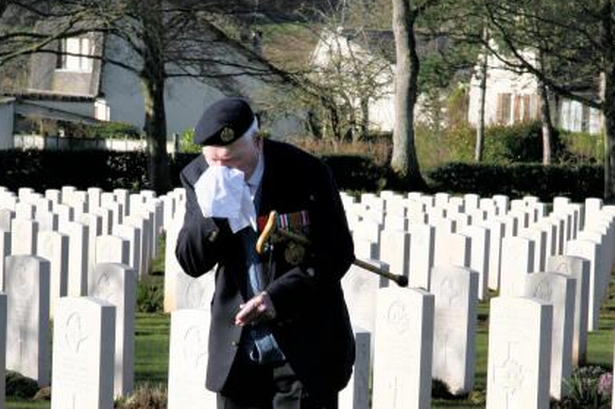John Mcilroy Shanks is a war hero who bravely fought in World War II over seven decades ago. He has made a moving pilgrimage to the D-Day beaches. The former sapper was only 19 years old when he valiantly stormed the beaches of Normandy on June 6th 1944, amidst an inferno of gunfire and artillery blasts.
He has now opted to return to the place where he helped facilitate the liberation of Europe for the first time. His sons and other veterans accompanied him on the trip. His great grandfather John, from Falkirk, served as a combat engineer. They worked on constructing bridges over rivers and canals to aid tanks and infantry soldiers in their march towards Nazi Germany.
Earlier this year, 100 years after his dad was awarded the Croix de Guerre in World War I, he was given the Legion d’Honneur by the French for his service. John Mcilroy Shanks said the trip to northern France was a great pleasure for him, but it certainly had an emotional impact. It was the first time he has been back to Normandy since D-Day, and he would love to do it again. One of the veterans with him had a brother who died in Normandy; the tour guide was able to take him to his brother’s grave.
While veteran Horace Smith went to his brother Tommy’s grave for the first time, John Mcilroy Shanks looked on from nearby. The grave was located in Fontenay Le Pesnel military cemetery. Horace, his son Paul, and grandson Sam laid a small cross with a poppy over the grave. It was a trip full of emotional moments. John was seen as a hero everywhere that he went, as he proudly wore his Legion d’Honneur.
Even while passing through the Bayeux cathedral, John Mcilroy Shanks was stopped by a German tourist who thanked him and declared “respect” for his bravery during that war. The trip consisted of a daytime venture to Arromanches, where he was thanked for defending freedom by three young Canadian girls that shook his hand.
Mr Mcilroy Shanks and his sons Jim and John Jr. took the time to visit the grave of an Argyll and Sutherlands soldier. They laid a cross at the grave in memory of his dad James, who had served with the regiment at the Somme. More amazingly, Mcllroy and other veterans paid their respects to the 22,000 German soldiers buried at La Cambe cemetery. It was a respectful act of reconciliation.
He was able to travel to France due to a fund that was established by the United Kingdom government. The Royal British Legion set up a fund that provides free trips back to the Normandy beaches for D-Day veterans. Today, most of them are in their 90’s, John Mcilroy Shanks said:
“It was great to wear my medal in France and see that people were so happy to see me. It was very humbling. People should not forget what went on. It was sad sometimes but it is important people remember the sacrifice. I joined the Army at 17 and I never regretted it. It was the greatest experience of my life.”
Many people look back on war and think the soldiers who fought were men. Yet they were not men; they were just boys around 18 and 19 years old. Many graves were filled by those same 18 and 19 year olds. Mcllroy remembers that his unit lost a high number of men on that bloody Normandy beach, saying:
“We weren’t on the beach that long. We were carrying a lot of kit but I would have given Roger Bannister a run for his money as we tried to get off the beach. When we landed, the Germans must have recovered from the initial assault. They then started shelling the beach. Planes were strafing the beach. They had realized there was an invasion going on. I was first off the boat, maybe I was stupid, but I said, ‘I’m getting off this boat first.’”
When John Mcilroy Shanks arrived at Arlenburh over the River Elbe in Austria it was one of his last actions during the war. Upon arrival they built this bridge to link up with the Russians. They shook hands and exchanged cigarettes, thinking the German air force was finished at that point. However, it turned out they were not finished at the bridge. The Messerschmitts were coming across and occasionally you had to run like hell. The German planes overhead were dropping firing shells that were the size of carrots.
Jim (Mcllroy’s son) expressed how enjoyable and memorable their return to the scene had been. The reaction of the French at Arromanches coupled with the German tourist in the cathedral was by far the most special. Furthermore, the veteran who was able to visit his oldest brother’s grave for the first time was emotional for everyone. Jim admitted that to this day it brings tears to his eyes and a lump to his throat.
